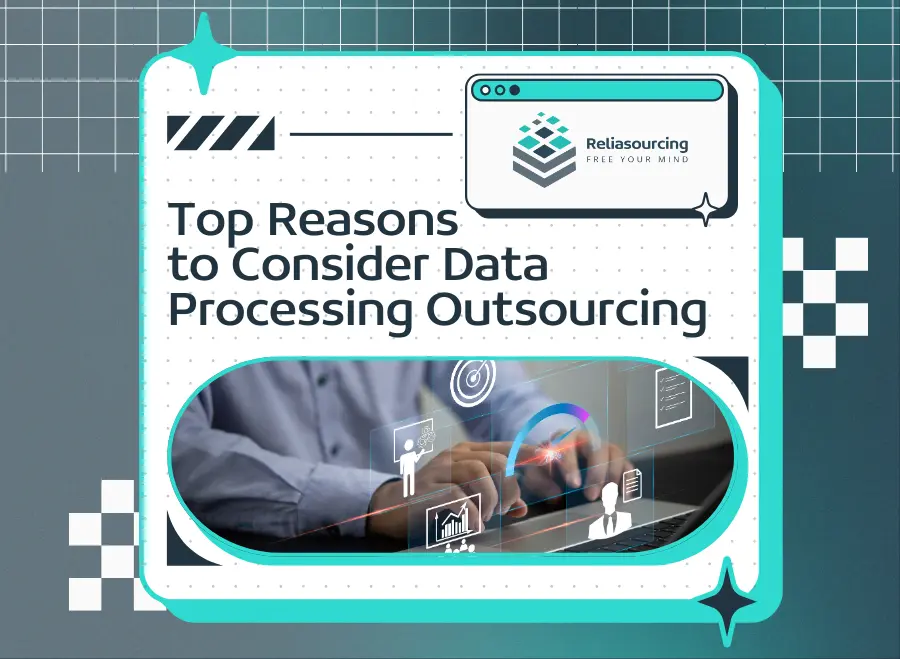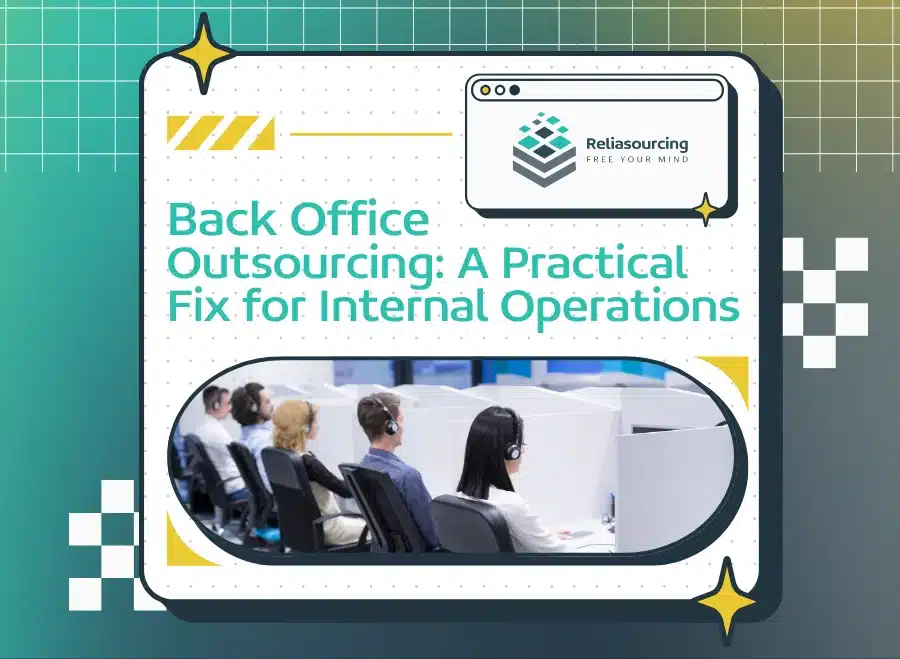Managing large volumes of data can be overwhelming for businesses today. The digital age offers opportunities and challenges in data utilization. Data processing outsourcing provides a practical solution for operational efficiency. Partnering with experts helps businesses make better decisions and drive innovation. This allows companies to focus on their core objectives.
Look into the key aspects and benefits of data processing outsourcing, and how it can help your business unlock its full potential through effective data management.
What is data processing outsourcing?
Data processing outsourcing involves delegating tasks to third-party providers. They handle everything from data entry to complex analytics. Outsourcing ensures tasks like managing databases are done accurately. The approach enhances efficiency in processing financial records and generating insights.
What used to be a simple cost-saving measure has evolved into a strategic approach now that companies see great potential in outsourcing not just to cut expenses but also to streamline workflows, access specialized expertise, and enhance turnaround times. With advancements in AI, tasks such as data cleansing or predictive analysis can be completed with remarkable speed and precision, making outsourcing an invaluable asset for modern businesses. The scope of services also continues to expand, offering businesses unparalleled flexibility in managing their data operations, becoming more than just about offloading tasks and heading towards adopting a strategic partnership that enhances overall operational agility.
The importance of data processing for businesses
Data is the foundation for smart decisions in increasingly faster pace industries, especially in sectors like finance, e-commerce, social gaming, and software-as-a-service (SaaS), hence proper management of this resource is essential to staying competitive and achieving growth.
- Efficient decision-making. Processed data turns raw information into actionable insights, helping businesses identify trends, optimize strategies, and make informed decisions. A fintech company, for example, can use data insights to predict market changes and improve services. Similarly, e-commerce platforms can leverage analytics to refine inventory management, ensuring stock aligns with customer demands.
- Regulatory compliance. Staying compliant with standards like GDPR or HIPAA is non-negotiable, particularly for industries handling sensitive information. Effective data processing ensures adherence to these rules, safeguarding both reputation and finances, so non-compliance can result in hefty fines and loss of customer trust, making this a critical aspect of data management. A robust approach to compliance also builds trust with clients, enhancing your brand image and long-term sustainability.
- Access to best practices in compliance and data security. Data security is paramount when outsourcing, especially for industries managing sensitive customer information. Partnering with providers that adhere to global standards like GDPR, HIPAA, and ISO 27001 is non-negotiable. Certifications demonstrate a commitment to robust data security measures, such as advanced encryption protocols, regular security audits, and real-time threat detection systems. Businesses should also demand clear data processing agreements (DPAs) to define responsibilities and establish accountability for data protection.
- Enhanced customer experience. When data is organized and analyzed effectively, businesses can personalize services, predict customer needs, and foster loyalty. For instance, an e-commerce platform can use processed data to recommend products tailored to individual preferences, creating a seamless shopping experience that encourages repeat business. In the same way, gaming companies can use data-driven insights to create engaging user experiences, boosting player retention and satisfaction.
Key benefits of outsourcing data processing
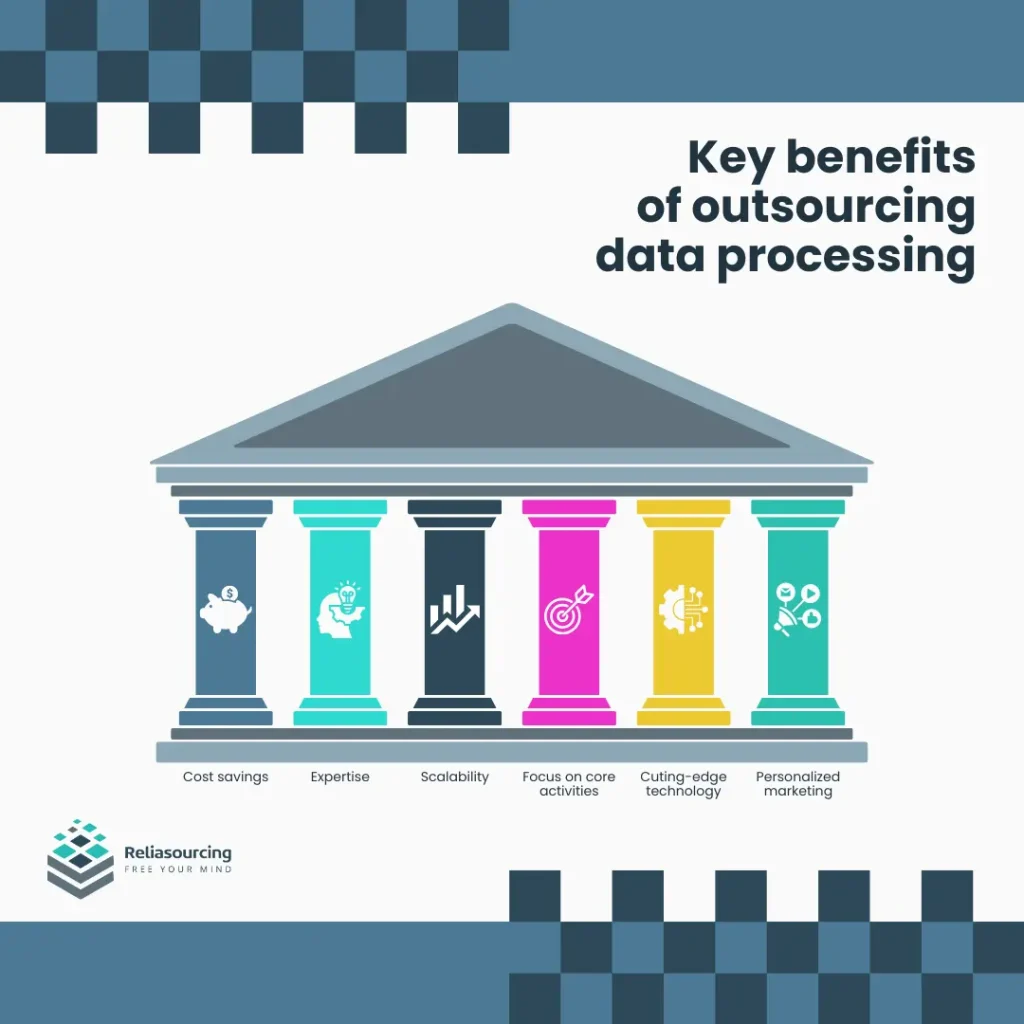
Outsourcing data processing empowers businesses to boost efficiency and focus on growth. Here’s how partnering with an expert provider like Reliasourcing makes a difference:
- Cost savings. Outsourcing reduces the costs of hiring, training, and maintaining an in-house team. Providers in the Philippines offer high-quality services at competitive rates, freeing up resources for innovation and expansion.
- Expertise. BPO providers bring skilled professionals and advanced tools to handle complex data tasks accurately and efficiently, and their industry-specific insights optimize processes and enhance outcomes.
- Scalability. Outsourcing allows you to adjust operations based on demand, ensuring agility during seasonal peaks or new product launches.
- Focus on core activities. Delegating routine tasks allows your team to prioritize strategic projects that drive innovation and customer satisfaction.
- Cutting-edge technology. Providers leverage AI-driven solutions to automate tasks, improving speed, accuracy, and efficiency without requiring significant investment on your part.
Types of data processing services available for outsourcing
Outsourcing providers offer a wide range of services tailored to different business needs. The following are some of the most commonly outsourced tasks:
Data entry and validation
Ensuring data accuracy and integrity, from financial records to customer databases. This foundational task is crucial for maintaining reliable datasets that support decision-making, and accurate data entry forms the bedrock of effective analytics and operational strategies.
Data cleansing
Eliminating inconsistencies and errors to create reliable datasets for analysis. Clean data is essential for accurate reporting and forecasting, hence data cleansing ensures that decision-makers work with information they can trust, avoiding costly errors or missteps.
Data conversion
Transforming information into usable formats for compatibility across systems, and this is especially important for businesses migrating to new platforms or integrating multiple software solutions. Effective data conversion minimizes disruptions during transitions, ensuring seamless operations.
Data analytics
Using AI to analyze trends, generate insights, and forecast future patterns critical for industries such as SaaS and gaming, which oftentimes goes hand-in-hand with AI outsourcing. Predictive analytics can uncover hidden opportunities and optimize resource allocation, so having advanced analytics enables businesses to anticipate market changes and remain proactive in their strategies.
Data management
Organizing and safeguarding data to streamline storage and retrieval processes. This ensures quick access to information when needed, improving operational efficiency, so robust data management practices also protect against losses, ensuring business continuity in the face of unexpected disruptions.
Other emerging trends
The field of data processing outsourcing continues to evolve with technological advancements and key trends, including adopting AI-driven data analytics to uncover actionable insights at unprecedented speeds and integrating blockchain technology for secure and transparent data transactions. Furthermore, outsourcing providers increasingly offer “Data as a Service” (DaaS) solutions, enabling businesses to access on-demand, real-time data tailored to their needs, enhancing operational efficiency, and positioning businesses to stay ahead in a data-driven economy.
Choosing a data processing outsourcing provider
Finding a reliable outsourcing provider is essential for a successful partnership. Have a look at this checklist to guide your decision:
- Experience. Look for a provider with a proven track record in your industry since their familiarity with industry-specific challenges can result in more effective solutions; experience ensures competence and a level of foresight that benefits your business.
- Data security. Ensure they comply with international standards like GDPR to protect sensitive information, given robust security measures are critical for maintaining customer trust. Secure data handling is a non-negotiable aspect of any outsourcing partnership.
- Scalability. Confirm their ability to handle workload fluctuations. A scalable partner ensures your operations remain seamless during periods of growth or high demand, given that scalability reflects a provider’s commitment to aligning with your business’s evolving needs.
- Technology. Choose a provider that uses advanced tools and automation because technology enhances accuracy, speed, and overall efficiency, so a tech-savvy partner ensures your processes remain competitive in a rapidly evolving landscape.
- Client references. Review testimonials or case studies to verify their reliability. Positive feedback from other businesses can provide valuable insights into their capabilities, making references and reviews act as indicators of a provider’s consistency and reliability.
- Customization. Opt for providers that offer tailored solutions to meet your unique needs. A one-size-fits-all approach rarely delivers optimal results, so customization ensures that the solutions you receive align closely with your strategic objectives.
Cost factors in data processing outsourcing
Evaluating the financial implications of in-house data processing versus outsourcing requires a balanced perspective. While in-house teams provide direct control over operations, they often come with costs tied to infrastructure, recruitment, and technology maintenance, and these continuous investments, along with commitments to regulatory compliance and system upgrades, can weigh heavily on an organization’s budget.
Outsourcing offers an alternative, delivering solutions while reducing financial strain. Providers take on critical responsibilities such as hiring, training, and implementing technology upgrades, alleviating much of the operational and financial overhead. Furthermore, outsourcing’s inherent scalability allows businesses to flexibly adapt to changing needs without incurring substantial additional costs, making it an efficient choice for organizations looking to optimize their data operations. Consider these differences:
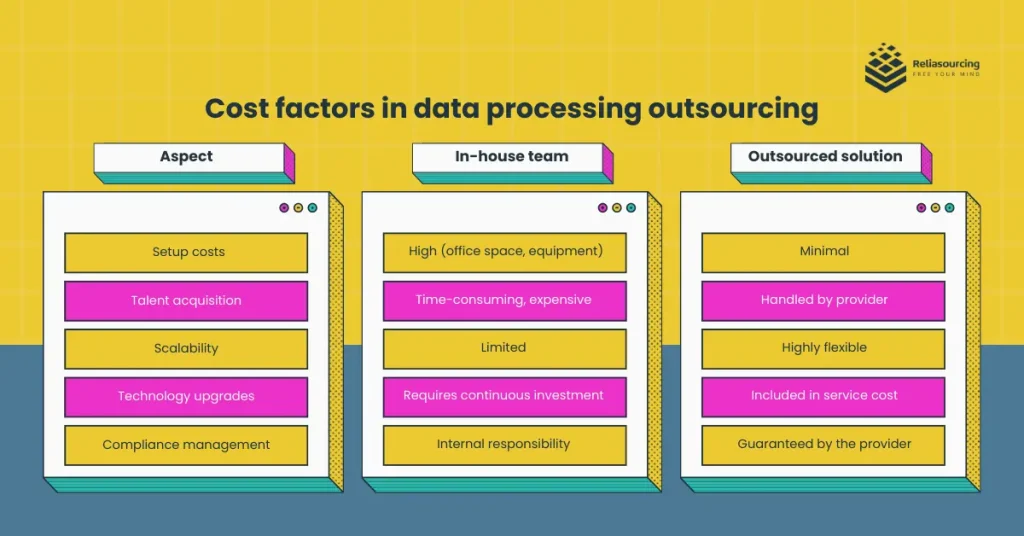
The table highlights cost considerations between the two approaches. Building an in-house team demands upfront investments, including physical infrastructure and specialized hiring, which can strain resources, particularly for smaller organizations. In contrast, outsourcing providers bundle these elements into their service packages, offering a more streamlined and cost-efficient solution. Scalability is another critical differentiator: while in-house operations may struggle to adjust quickly to market fluctuations, outsourcing ensures scalability to meet demand shifts efficiently.
Additionally, keeping up with technological advancements and regulatory requirements often falls squarely on in-house teams, necessitating continuous investments in finance and time. Outsourcing providers, however, integrate these aspects into their offerings, delivering cutting-edge tools and ensuring compliance without additional effort from the client.
This demonstrates that while in-house teams may suit businesses seeking direct oversight, outsourcing remains a strategic, cost-effective choice for managing data processing with flexibility, efficiency, and reliability.
Frequently asked questions
Is outsourcing data processing safe?
Outsourcing data processing can be safe when partnering with providers prioritizing robust security protocols. Trusted companies implement advanced security measures like end-to-end encryption, multi-factor authentication, and intrusion detection systems to safeguard sensitive information. Additionally, compliance with global standards such as GDPR and ISO 27001 ensures adherence to strict data protection frameworks.
What industries commonly outsource data processing?
Many industries commonly outsource data processing: finance uses it for compliance and transactions, e-commerce for customer data, gaming for player analytics, healthcare for records, and SaaS for user analytics, hence outsourcing reduces costs and boosts efficiency across sectors.
Can data processing outsourcing be customized?
Yes, data processing outsourcing can be customized since outsourcing in general is highly adaptable. Providers tailor services to tasks such as analytics or compliance and can scale operations as needed, and they integrate seamlessly with systems, aligning services to business goals for maximum flexibility and efficiency.
How Reliasourcing helps with data processing outsourcing

As a leading BPO company based in the Philippines, Reliasourcing combines tailored solutions with industry expertise. Want to know why businesses trust us? Here’s why:
- Custom services. We align our offerings with your goals to deliver meaningful results. Should you need routine data entry or advanced analytics, our solutions are designed to meet your unique needs, ensuring that your objectives drive our approach.
- Skilled professionals. Our team uses advanced AI solutions for accuracy and speed, and their expertise ensures that your data is handled with care and precision. The professionals we have stay ahead of industry trends, giving you the most effective solutions.
- Data security. Reliasourcing adheres to global compliance standards and ensures your information is safe. The robust security protocols we employ provide peace of mind, protecting your business from potential risks, since your data’s integrity is at the core of our operations.
- Cost efficiency. Outsourcing with us offers exceptional value without compromising quality and our competitive pricing ensures that you maximize ROI while benefiting from top-tier services, helping you achieve your goals without overextending your budget.
To put it simply
Outsourcing data processing is both a cost-saving strategy and a way to future-proof your business. With trusted providers like Reliasourcing, you can unlock new opportunities for growth, innovation, and efficiency. Leverage the expertise of outsourcing partners and you’ll find your business staying competitive in an increasingly data-driven world. The decision to outsource is an investment in your business’s future, empowering you to achieve operational excellence all while focusing on strategic priorities.
Ready to elevate your data operations? Contact Reliasourcing today and discover the difference we can make!

